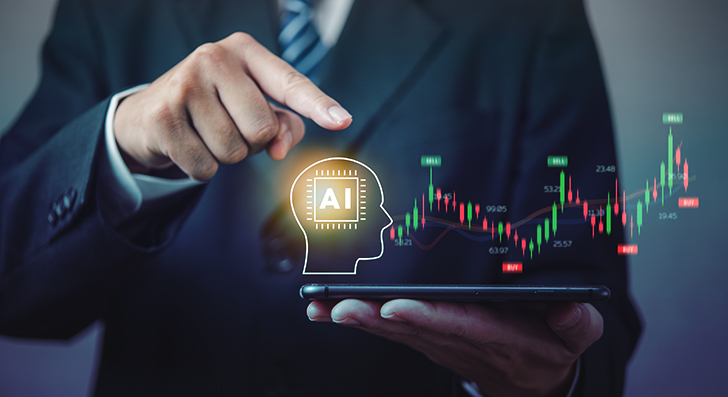The Role of Artificial Intelligence in Predicting Stock Market Trends
Description

The application of AI to sentiment analysis in financial reports, news articles, and social media could revolutionize the field of stock movement prediction. Algorithms that use natural language processing (NLP) can evaluate the tone of news headlines and social media conversations about particular stocks. The financial media frequently discusses investing in artificial intelligence (AI) stocks as investors want to profit from one of the industries that will have the biggest economic transformation in the 2020s: AI. AI is possibly changing not only how many firms function but also how investors view the technology sector because of its enormous potential for applications in healthcare, finance, entertainment, and other areas of the economy. But before diving into the realm of AI investing, one needs to know what makes this industry unique—it's characterized by rapid innovation, a shifting market, and an unusual blend of established firms and up-and-coming innovators. With this beginner's guide, you'll have all you need to get started in this buzzy and often complicated sector.
Prior considering investing in artificial intelligence (AI) equities, it is useful to understand how AI differs from more traditional firms. Due to their high valuations, which are frequently based more on growth potential than on current profitability, AI firms are appealing to investors because of their potential for capital appreciation as well as increased volatility and risk. The industry's dependence on continuous technical breakthroughs and the evolving regulatory landscape surrounding data use and privacy contribute to its rising complexity. Consequently, a strategic approach that strikes a balance between excitement for AI's potential and a realistic assessment of risks and market realities is crucial for investors navigating this thrilling but hard environment.
Artificial intelligence (AI) is a broad and quickly evolving field of study that focuses on building algorithms and computer processes that enable robots to do tasks that typically require human intelligence. Supporters assert that due to its many applications, it will fundamentally alter how businesses operate and render services. Many different businesses are debating the potential applications of AI. Medical imaging evaluation is often performed more rapidly and precisely by artificial intelligence (AI) systems than by human practitioners. By predicting the behavior of different compounds, artificial intelligence (AI) has the potential to accelerate the drug development process. Artificial intelligence (AI) systems can analyze market data in banking and investing at a speed and depth that is faster than human comprehension. AI algorithms may also be more accurate in assessing investment risks and credit scores. In the automotive industry, artificial intelligence is essential because it makes it possible to create self-driving cars that use sensor data to make decisions about how to drive. Artificial Intelligence has the potential to foresee maintenance needs and enhance production lines in the automotive sector. Analysts, investors, and industry professionals are arguing over this.
A bubble is characterized by high prices, high levels of speculation, a sharp increase in investments, and a highly positive market sentiment known as hype that leads to irrational investing behavior. Strong foundations underpin AI's growth and longevity as a transformative technology, despite signs that some parts of the market may be overvalued. Technical analysis books could be helpful for traders who want to learn more about using technical analysis in their trading. Investors should exercise caution, conduct in-depth research, and consider long-term trends before making decisions in this industry. Considering the revolutionary influence artificial intelligence is having on a number of industries, investing in AI stocks has the potential to yield significant profits.
Artificial intelligence (AI) can identify complex trends and patterns in the market that human traders would overlook. By recognizing these patterns, AI-powered platforms can generate more accurate predictions of future market movements. Deals are completed in milliseconds by the AI algorithms, allowing investors and financial institutions to profit from even the tiniest price variations. Artificial intelligence (AI) is being incorporated into stock market trading systems to improve their ability to analyze market data and execute deals faster and more precisely. Asset management companies using AI have achieved a stock price forecast accuracy of above 80%. On the other hand, it has also been found that algorithms offer superior efficiency at lower costs. In order to find patterns in historical data and predict future events, machine learning algorithms such as neural networks analyze the data.
Because AI systems are always learning and evolving, traders and investors can access real-time market trends and receive assistance in making informed decisions. The performance of the stock could be impacted by each of these. Should you be considering investing in stocks related to artificial intelligence (AI), you should consider these dynamics. Erroneous data can lead to incorrect predictions because AI models are only as good as the data they are trained on. It's possible that biases from the training set of the algorithms led to unjust or discriminatory outcomes. This calls for conducting in-depth research to understand the potential and risks associated with AI investments, diversifying across multiple AI firms and subsectors, and maintaining a long-term investing perspective in order to lower risk and manage the resulting volatility. If you combine these aspects with traditional investing analysis, you may be able to benefit from the development opportunities that artificial intelligence offers and make better decisions.
Foreword
The application of AI to sentiment analysis in financial reports, news articles, and social media could revolutionize the field of stock movement prediction. Algorithms that use natural language process

Comments